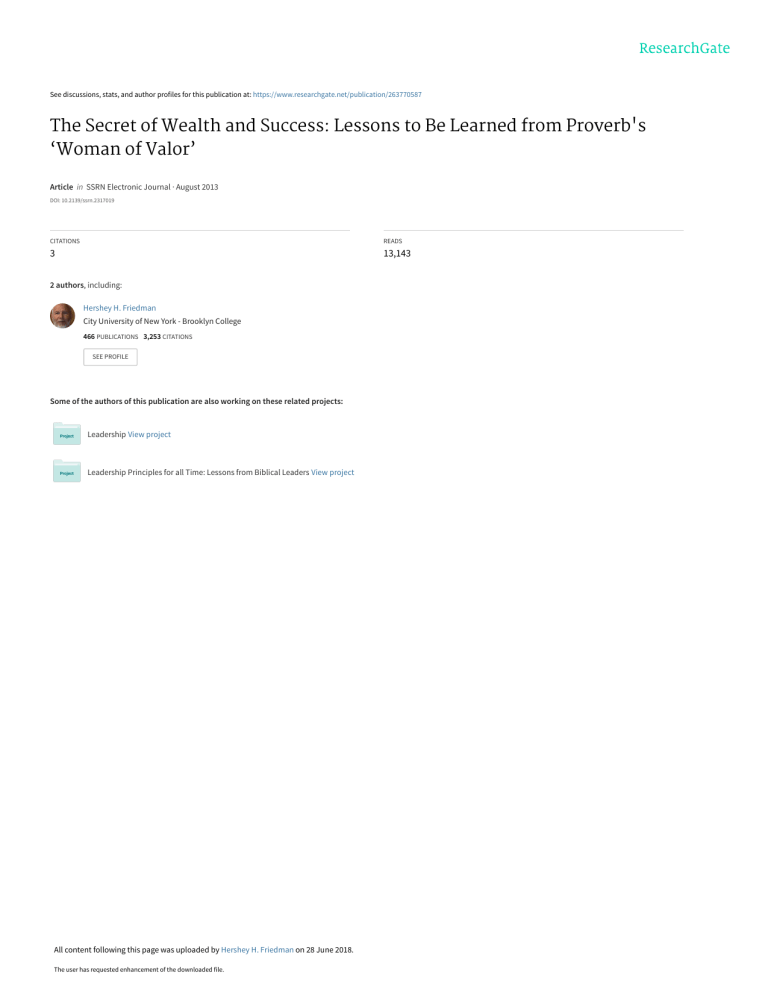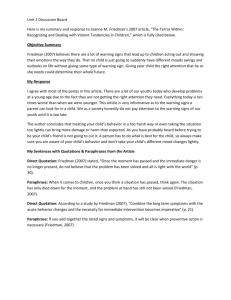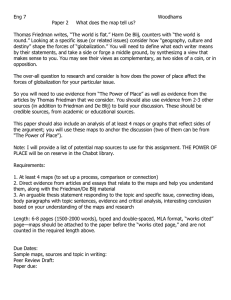
See discussions, stats, and author profiles for this publication at: https://www.researchgate.net/publication/263770587 The Secret of Wealth and Success: Lessons to Be Learned from Proverb's ‘Woman of Valor’ Article in SSRN Electronic Journal · August 2013 DOI: 10.2139/ssrn.2317019 CITATIONS READS 3 13,143 2 authors, including: Hershey H. Friedman City University of New York - Brooklyn College 466 PUBLICATIONS 3,253 CITATIONS SEE PROFILE Some of the authors of this publication are also working on these related projects: Leadership View project Leadership Principles for all Time: Lessons from Biblical Leaders View project All content following this page was uploaded by Hershey H. Friedman on 28 June 2018. The user has requested enhancement of the downloaded file. The Secret of Wealth and Success: Lessons to be Learned from Proverb’s ‘Woman of Valor’ Hershey H. Friedman, Ph.D. Professor of Business Finance and Business Management Department School of Business Brooklyn College of the City University of New York E-mail: x.friedman@att.net Toby H. Birnbaum, J.D. Assistant Professor of Law and Management Finance and Business Management Department School of Business Brooklyn College of the City University of New York E-mail: tbirnbaum@brooklyn.cuny.edu Abstract We live in a time when the importance of corporate social responsibility and ethics is apparent. Sadly, it is obvious that most leaders are more interested in making money than doing the right thing. The “Woman of Valor” described in Proverbs shows us what it takes to be successful: industriousness, entrepreneurship, honesty, kind-heartedness, devotion to family, and devotion to spiritual values. Keywords: business ethics, woman of valor, entrepreneurship, Bible, spiritual values. 1 Introduction The Book of Proverbs (Mishley) is part of the Hebrew Bible and is attributed to King Solomon. However, the authorship of Proverbs has been a matter of dispute. If King Solomon was the author, Proverbs could be 3,000 years old. Proverbs ends with the advice of the queen-mother to the king (Lemuel who some, but not all, commentaries assume is Solomon). She criticizes her son and tells him to judge righteously and to be concerned about the poor and the destitute (Proverbs 31: 3-9). She also counsels her son not to dedicate his life to personal pleasure, i.e., women and wine. In her words (Psalms 31:3): “Do not give your strength to women, or your ways to that which destroys kings.” What destroys many leaders is a preoccupation with pleasure seeking and power. The queen-mother knew exactly what it takes to be successful as a leader. A leader has to speak up for the “mute” -- those who have no one to defend them. Her words (Proverbs 31:8) are as valuable to today as they were: “Open your mouth for the mute; for the rights of all the unfortunate.” Proverbs ends with a paean to the virtuous woman (“eishes chayil”), sometimes translated as the “woman of valor’ or “woman of worth” (Proverbs 31: 10-31). The word “chayil” has multiple meanings in Hebrew and may be translated as valor, piety, energetic and upright, worthy, wealthy, and successful. The king is praising his mother who has given him timeless advice as well as criticism. This advice should be heeded by every leader. Moreover, every leader should surround himself or herself with someone who provides criticism. Friedman & Friedman (2013) establish that one of the reasons that Hitler failed as a leader was because virtually all of his advisors were afraid to speak up when he was making serious military mistakes. 2 The virtuous woman described here has much to teach us on how to be successful. 10 Who can find a virtuous woman? For her value is far above pearls. 11 Her husband’s heart relies on her, and he shall lack no gain. 12 She will do him good and not evil all the days of her life. 13 She seeks wool, and flax, and works willingly with her hands. 14 She is like the merchants' ships; she brings her food from afar. 15 She arises while it is yet night, and gives food to her household, and a portion to her maidservants. 16 She considers a field, and buys it; from the fruit of her handiwork she plants a vineyard. 17 She girds her loins with strength, and strengths her arms. 18 She perceives that her merchandise is good; her lamp does not go out by night. 19 She stretches out her hands to the spindle, and her palms hold the distaff. 20 She spreads out her palm to the poor; she extends forth her hands to the needy. 21 She is not afraid of the snow for her household: for all her household are clothed with scarlet wool. 22 She makes for herself coverings of tapestry; her clothing is linen and purple wool. 23 Her husband is known in the gates, when he sits among the elders of the land. 24 She makes a cloak and sells it; and supplies aprons to the merchants. 25 Strength and honor are her clothing; and she shall rejoice in time to come. 26 She opens her mouth with wisdom; and the lesson of kindness is on her tongue. 27 She anticipates the ways of her household, and does not eat the bread of idleness. 28 Her children rise up and praise her; her husband also, and he extolls her. 29 Many women have acquired wealth, but you surpassed them all. 30 Charm is deceitful, and beauty is vain: but a woman that fears the Lord, she shall be praised. 31 Give her of the fruit of her hands; and let her be praised in the gates by her very own deeds. (Proverbs 31: 10-31) What can we learn from the woman of valor? (A) Industriousness There are several verses that make it quite clear that she works hard for her family. Hard work is 3 the first secret of success. This worthy woman is not indolent and works hard; she even arises while it is still dark. 13 “She seeks wool, and flax, and works willingly with her hands.” 15 “She arises while it is yet night, and gives food to her household, and a portion to her maidservants.” 17 “She girds her loins with strength, and strengths her arms.” 19 “She stretches out her hands to the spindle, and her palms hold the distaff.” 27 “She anticipates the ways of her household, and does not eat not the bread of idleness.” There are two verses in Proverbs that make very strong cases for industriousness: “Do you see a man diligent in his work? He will stand before kings; he will not stand before insignificant men” (Proverbs 22:29) and “Go to the ant you sluggard; consider her ways and be wise” (Proverbs 6:6). Solomon recognized that hard work and assiduousness paid off. The Talmud1 states: “A person should love work and not hate it; for just as the Torah was given with a covenant, so too was work given with a covenant” (Babylonian Talmud, Avot D'Rabbi Noson 11:1). Schnall (2001: 49) feels that this text supports the view that Judaism sees “that the six days of labor hold intrinsic religious value in rough parallel to the spiritual benefits derived from the Sabbath itself.” 1 The Talmud is the compilation of Jewish oral law and consists of the mishna and the gemara. The mishna was compiled and redacted by Rabbi Yehuda HaNasi about the year 189 C.E. The gemara consists mainly of commentaries and discussions of the mishna and was put into written form about 1,500 years ago. 4 (B) Entrepreneurship 13 “She seeks wool and flax, and works willingly with her hands.” 16 “She considers a field, and buys it; from the fruit of her handiwork she plants a vineyard.” 24 “She makes a cloak and sells it; and supplies aprons to the merchants.” The second secret of success is being entrepreneurial. The woman of valor seeks wool and flax because she wants to spin it and make cloaks and aprons to sell. She also wants to purchase real estate and takes her time in selecting a good property. According to Schnall (2001: 50), Judaism sees self-sufficiency as providing spiritual benefits. This is based on an enigmatic statement in the Talmud (Babylonian Talmud, Berakoth 8a): “A person who benefits from the labor of his hands is greater than one who fears Heaven,” derived from Psalms (128:2): “When you eat the labor of your hands, you shall be happy, and it shall be well with you.” Tamari (1987: 87) states that “in Judaism, the merchant and the entrepreneur play a legitimate and even desirable role in commerce and therefore are morally entitled to a profit in return for fulfilling their function.” It is not only Judaism that values entrepreneurship and industriousness. Sirico (2001) interprets the parable of the talents in Matthew (25:14-30) as a lesson in demonstrating the importance of using one’s abilities, resources, capital, aptitude, and time to achieve something. (C) Ethics and Integrity 18 “She knows that her merchandise is good; her lamp does not go out by night.” 5 The “Woman of Valor” understands the importance of business ethics. She is God-fearing and is aware that there are more than 100 precepts in the Torah that deal with business ethics (Friedman, 2000). These precepts include: caring for the poor, not discriminating against the stranger, treating employees fairly, paying wages and rents on time, providing fringe benefits for employees, maintaining honest and stable prices, ensuring accuracy in weights and measures, acting in a manner that ensures one is above suspicion, and providing an honest day’s work. Friedman (2000) concludes that Scripture makes clear that individuals and organizations that act ethically will achieve ultimate success. Jack Welch, former CEO of GE, referred to the corporate goal of maximizing shareholder value as the “dumbest idea in the world” (Denning, 2011). It is not only immoral but a good way to destroy an organization in the long run. What matters is making a high quality, constantly improving product so that customers are always satisfied. (D) Charity and Kindness 20 “She spreads out her palm to the poor; she extends forth her hands to the needy.” 26 “She opens her mouth with wisdom; and the lesson of kindness is on her tongue.” Friedman (2012) demonstrates that the Talmud believed that wealth was a reward from God. In fact, those who were charitable would be rewarded with prosperity. The Talmud proves this from many verses in scripture. For example, Proverbs (3: 9-10) clearly states: 6 “Honor the Lord with your wealth and with the first of all your produce; then your storehouses will be filled with plenty, and your vats will be bursting with wine.” The Talmud (Babylonian Talmud, Taanis 9a) describes wealth as a reward from God. In wordplay on the verse (Deuteronomy 14: 22): “You shall surely tithe,” the Talmud advises that one should tithe in order to become rich (the Hebrew word “to tithe” is very similar to “to become rich”). The verse (Proverbs 11:24), “There is one who scatters and yet is given more” is interpreted as referring to one who spends his money on the needy. Wealth is seen as “comely to the righteous and comely to the world” (Babylonian Talmud, Avos 6:8), and affluent people who used their possessions to help others were respected by the Talmudic sages (Babylonian Talmud, Eruvin 86a). The rabbis of the Talmud made it very clear that the punishment for refusing to help the indigent or pay tithes was poverty (Babylonian Talmud, Temurah 16a; Midrash Tanchuma, Vayishlach 10; Sifri Deuteronomy 134). A proverb popular proverb in Jerusalem was: “Salt (i.e., preserve) money by diminishing it”; in other words, “The more you give, the more you will have to give. (F) Wisdom 26 “She opens her mouth with wisdom; and the lesson of kindness is on her tongue.” A wise person understands that helping others is what truly matters in life. (G) Dedication to family 21 “She is not afraid of the snow for her household: for all her household are clothed with scarlet wool.” 7 28 “Her children rise up and praise her; her husband also, and he extolls her.” There is no question that family is of great importance. There are numerous verses in Scripture that emphasize the value of family (Fairchild, 2013). Two of the Ten Commandments deal directly with family (Exodus 20: 12-13) : "Honor your father and mother so that your days will be lengthened in the land the Lord, your God, is giving you" and “you shall not commit adultery.” Children are referred to by the Psalmist (127: 3) as the “heritage of the Lord.” (H) Spirituality 30 “Charm is deceitful, and beauty is vain: but a woman that fears the Lord, she shall be praised.” 29 Many women have acquired wealth, but you surpassed them all. We have to believe that there is something much more important than living for personal pleasures. Needless to say, the Great Recession of 2008 made us all aware of what happens when the only value that matters to leaders is “greed is good” or “maximization of shareholder value” (Friedman & Friedman, 2009). One wonders how executives can live with themselves knowing that shoddy products made by their firms resulted in the death of innocent people. Recently, 1,132 factory workers died in Bangladesh when the 9-story building they worked in collapsed. There were nine reasons for the collapse of Rana Plaza. Two of the reasons were: The building was constructed on swampy land made for, at most, a six-story building and the materials used for construction were sub-standard (Mirdha, 2013). CEOs are even willing to risk the lives of employees in the name of profit. 8 Conclusion The “Woman of Valor” shows us what it takes to be successful: industriousness, productivity, entrepreneurship, honesty, benevolence and altruism, devotion to family, and devotion to God. Hertz (1959: 404-405) describes this worthy woman as “industrious and sagacious kind-hearted and honoured.” Hertz (1959: 406) asserts that “she is kind to the poor, and gentle to all; selfrespecting and dignified, with Religion as the root and basis of her life.” One might disagree with Hertz and say that it is not so much about religion but about spiritual values. People with spiritual values believe that life is meaningful and have a desire to make the world a better place. They feel that life has a greater purpose than pleasure-seeking and feel a “connectedness to something greater than self” (Friedman and Friedman, 2008). It is quite possible for a person to be spiritual without being part of any organized religion. The latest research on productivity and success by Grant (2013) validates that the most successful people are “givers.” Givers are altruistic individuals who love helping others without requiring or expecting reciprocity. Helping others with no strings attached is the way to succeed in life. The author of Proverbs was way ahead of his time in recognizing the importance of women in the workforce. Sadly, even today many countries discriminate against women. Acemoglu and Robinson (2012) believe that there is a strong relationship between the political system and economic system. Societies that are successful are “inclusive” and empower women, encourage innovation and entrepreneurship, strengthen education, and provide incentives for people to better themselves. The “woman of valor” would certainly agree with that. 9 References Acemoglu, D. and Robinson, J. (2012). Why nations fail: The origins of power, prosperity, and poverty. New York: Radom House, Inc. Denning, S. (2011, November 28). The dumbest idea in the world: Maximizing shareholder value. Forbes. Retrieved from http://www.forbes.com/sites/stevedenning/2011/11/28/maximizing-shareholder-valuethe-dumbest-idea-in-the-world/ Fairchild, M. (2013). Bible verses about family. About.com. Retrieved from http://christianity.about.com/od/Bible-Verses/qt/Bible-Verses-Family.htm Friedman, H. H. and Friedman, L. W. (2013, June 19). Springtime for Hitler: Lessons in leadership. SSRN. Available at SSRN: http://ssrn.com/abstract=2282003 or http://dx.doi.org/10.2139/ssrn.2282003 Friedman, H. H. (2012). The Talmud as a business guide. Multidisciplinary Journal for Applied Ethics. 2012, 1(1), 38-48. Available at: http://mjae.ffdi.hr/download/MJAE_1st_Issue/7%20%20PAPER%204%20FRIEDMAN.pdf Friedman, H. H. (2000). Biblical foundations of business ethics. Journal of Markets and Morality, 3(1), Spring, 43-57. Friedman, H. H. and Friedman, L. W. (2008). Can 'homo spiritualis' replace homo economicus in the business curriculum? December 2008, 2(2), e-Journal of Business Education & Scholarship of Teaching, 1-11. Friedman, H. H. and Friedman, L. W. (2009). The global financial crisis of 2008: What went wrong? SSRN. Available at SSRN: http://ssrn.com/abstract=1356193 or http://dx.doi.org/10.2139/ssrn.1356193 Grant, A. (2013). Give and take: A revolutionary approach to success. New York: Viking. Hertz, J. H. (1959). The authorized daily prayer book. New York: Bloch Publishing Co. Mirdha, R. U. (2013, June 27). Nine reasons for Rana Plaza collapse. Daily Star. Retrieved from http://www.thedailystar.net/beta2/news/nine-reasons-for-rana-plaza-collapse/ Schnall, D. J. (2001). By the Sweat of Your Brow: Reflections on Work and the Workplace in Classic Jewish Thought. Hoboken, NJ: Ktav Publishing/Yeshiva University Press. 10 Sirico, R. A. (2001). The Biblical case for entrepreneurship. Religion and Liberty. 11(1), 1-2, from http://www.acton.org/pub/religion-liberty/volume-11-number-1/biblical-caseentrepreneurship Tamari, M. (1987). With all your possessions: Jewish ethics and economic life. New York: The Free Press. 11 View publication stats


